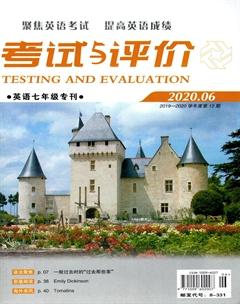Unit 12词语和句型考点归纳
宣青檀
【词语精讲】
1. sheep n. 羊;绵羊
sheep用作名词,其原义为“羊;绵羊”,比喻义为“胆小鬼”,是可数名词,单复数同形。如:
There are three sheep eating grass under the tree. 树下有三只羊在吃草。
A goat is difficult from a sheep. 山羊和绵羊不同。
The sheep always say they are careful. 膽小鬼往往自称细心。
【拓展】 black sheep意为“害群之马;败类;不肖之子”。如:
He's the black sheep of the family. 他是这个家族中的败类。
2. as prep. & adv. 作为;当作
as用作介词时,意为“作为;当作;以……身份;像……一样”。如:
She works as a secretary in that company. 她在该公司担任秘书。
The old woman was dressed as a young lady. 这位老妇人打扮得像一位年轻女士。
3. camp v. 扎营;搭帐篷
(1) camp用作动词时,意为“扎营;搭帐篷”,它的过去式为camped。其固定搭配为:go camping去露营。go 后接动名词形式,表示“去做……”。类似的短语还有:go shopping 去购物;go swimming 去游泳;go hiking 去徒步旅行等。如:
The hunters camped in the valley. 猎人们在山谷中扎营。
I went shopping with my mother yesterday. 我昨天和妈妈去购物了。
(2) camp用作名词,意为“露营”。如:
We're going to have a sports camp in the countryside during the summer vacation. 暑假期间我们要在乡下搞一次运动营。
4. stay up late 深夜不睡;熬夜
When I am with you, we stay up late all night. 当我和你一起时,我们整夜醒着。
You won't stay up late, will you? 你不会熬夜,对吗?
【拓展】 stay away (from)意为“离开;缺席;不在;外出”;stay at意为“暂住在……,投宿在……”;stay in意为“在家里;不外出”。如:
Why did you stay away from school? 你为什么不上学?
They usually stay at home on Sunday. 他们星期天通常呆在家里。
5. run away 跑开
run away意为“跑开;逃跑;走掉;逃脱”。如:
She hit the boy and he ran away. 她打了那个小男孩,那小男孩就跑了。
The horse became frightened and ran away. 那匹马受惊跑掉了。
【拓展】 run away from意为“逃离……”。如:
He tried to run away from school. 他试图逃学。
Mary has run away from home, but her family are putting a good face on it. 玛丽已经离家出走,但她的家里人却装作若无其事。
6. shout at & shout to
shout at意为“冲……大声叫嚷”,多指因为生气等而非善意地对某人吼叫;shout to意为“对……大声喊叫”,多指因距离远而不得不大声叫喊(否则对方无法听见),不带生气等感情因素。如:
He shouted at his son. 他对他儿子大吼大叫。( 意在训斥某人)
He shouted to his son. 他朝他儿子大声喊。 (无训斥某人之意)
7. put up 搭起;举起
put up指“搭起;建造”时,多指临时搭建。如:
Put up your hands if you know the answer. 假如你知道答案,请举手。
They put up the tent in the hillside. 他们在山坡上搭建了帐篷。
【拓展】 (1) put up with意为“忍受;容忍”。如:
We don't have to put up with him anymore. 我们不用再忍受他了。
(2) put down意为“放下;记下”。如:
You should put down every word she says. 你应该记下她说的每句话。
After two rings I put down the phone. 响铃两声后,我放下了电话。
8. each other 互相
each other=one another,用作相互代词,意为“互相;彼此”,通常用作动词或介词的宾语。如:
Uncle Paul and I hardly know each other. 我和保罗叔叔几乎互不相识。
We are very familiar with each other. 我们相互之间很熟。
Both of you do these things for each other. 你们都在为对方做这些事。
【短语链接】
1. badminton 羽毛球 → play badminton 打羽毛球
2. away 离开;远离 → run away 跑开
3. high 高的(地) → high school 中学
4. kite 风筝 → fly a kite 放风筝
5. surprise 惊奇 → get a surprise 吃惊
【短语串串】
1. make a fire 生火
2. in the countryside 在乡村
3. go to sleep 入睡
4. the next morning 第二天早上
5. look out of 向……外看
6. work as... 以……身份工作
【难句在线】
1. It was important not to go near a snake. 重要的是不要靠近蛇。
It is + 形容词 + to do... 是英语中一个重要的句型。能够这样用的形容词除了important外, 我们学过的还有easy, difficult, hard等。表示“做某事是容易(困难)的”。如:
It is difficult for me to study English. 对我来说学英语很难。
It is easy for me to get up early. 对我来说早起很容易。

